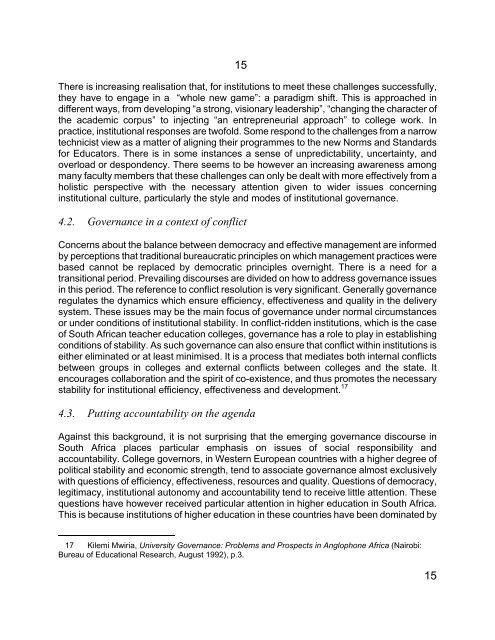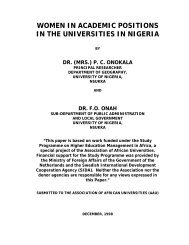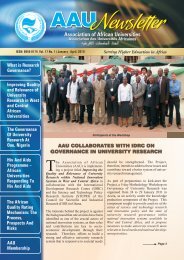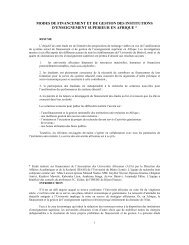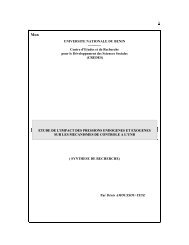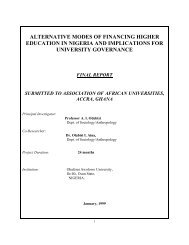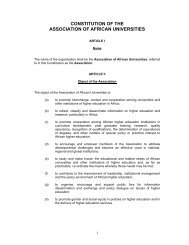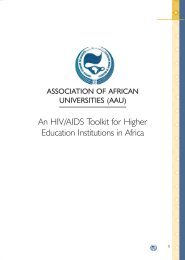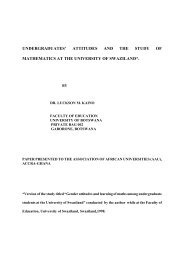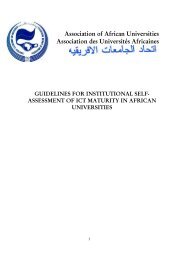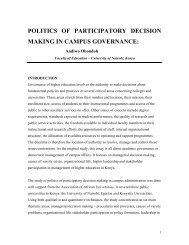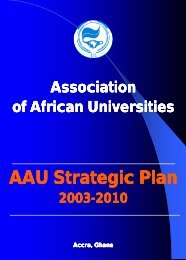governing teacher education colleges in south africa
governing teacher education colleges in south africa
governing teacher education colleges in south africa
Create successful ePaper yourself
Turn your PDF publications into a flip-book with our unique Google optimized e-Paper software.
15<br />
There is <strong>in</strong>creas<strong>in</strong>g realisation that, for <strong>in</strong>stitutions to meet these challenges successfully,<br />
they have to engage <strong>in</strong> a “whole new game”: a paradigm shift. This is approached <strong>in</strong><br />
different ways, from develop<strong>in</strong>g “a strong, visionary leadership”, “chang<strong>in</strong>g the character of<br />
the academic corpus” to <strong>in</strong>ject<strong>in</strong>g “an entrepreneurial approach” to college work. In<br />
practice, <strong>in</strong>stitutional responses are twofold. Some respond to the challenges from a narrow<br />
technicist view as a matter of align<strong>in</strong>g their programmes to the new Norms and Standards<br />
for Educators. There is <strong>in</strong> some <strong>in</strong>stances a sense of unpredictability, uncerta<strong>in</strong>ty, and<br />
overload or despondency. There seems to be however an <strong>in</strong>creas<strong>in</strong>g awareness among<br />
many faculty members that these challenges can only be dealt with more effectively from a<br />
holistic perspective with the necessary attention given to wider issues concern<strong>in</strong>g<br />
<strong>in</strong>stitutional culture, particularly the style and modes of <strong>in</strong>stitutional governance.<br />
4.2. Governance <strong>in</strong> a context of conflict<br />
Concerns about the balance between democracy and effective management are <strong>in</strong>formed<br />
by perceptions that traditional bureaucratic pr<strong>in</strong>ciples on which management practices were<br />
based cannot be replaced by democratic pr<strong>in</strong>ciples overnight. There is a need for a<br />
transitional period. Prevail<strong>in</strong>g discourses are divided on how to address governance issues<br />
<strong>in</strong> this period. The reference to conflict resolution is very significant. Generally governance<br />
regulates the dynamics which ensure efficiency, effectiveness and quality <strong>in</strong> the delivery<br />
system. These issues may be the ma<strong>in</strong> focus of governance under normal circumstances<br />
or under conditions of <strong>in</strong>stitutional stability. In conflict-ridden <strong>in</strong>stitutions, which is the case<br />
of South African <strong>teacher</strong> <strong>education</strong> <strong>colleges</strong>, governance has a role to play <strong>in</strong> establish<strong>in</strong>g<br />
conditions of stability. As such governance can also ensure that conflict with<strong>in</strong> <strong>in</strong>stitutions is<br />
either elim<strong>in</strong>ated or at least m<strong>in</strong>imised. It is a process that mediates both <strong>in</strong>ternal conflicts<br />
between groups <strong>in</strong> <strong>colleges</strong> and external conflicts between <strong>colleges</strong> and the state. It<br />
encourages collaboration and the spirit of co-existence, and thus promotes the necessary<br />
stability for <strong>in</strong>stitutional efficiency, effectiveness and development. 17<br />
4.3. Putt<strong>in</strong>g accountability on the agenda<br />
Aga<strong>in</strong>st this background, it is not surpris<strong>in</strong>g that the emerg<strong>in</strong>g governance discourse <strong>in</strong><br />
South Africa places particular emphasis on issues of social responsibility and<br />
accountability. College governors, <strong>in</strong> Western European countries with a higher degree of<br />
political stability and economic strength, tend to associate governance almost exclusively<br />
with questions of efficiency, effectiveness, resources and quality. Questions of democracy,<br />
legitimacy, <strong>in</strong>stitutional autonomy and accountability tend to receive little attention. These<br />
questions have however received particular attention <strong>in</strong> higher <strong>education</strong> <strong>in</strong> South Africa.<br />
This is because <strong>in</strong>stitutions of higher <strong>education</strong> <strong>in</strong> these countries have been dom<strong>in</strong>ated by<br />
17 Kilemi Mwiria, University Governance: Problems and Prospects <strong>in</strong> Anglophone Africa (Nairobi:<br />
Bureau of Educational Research, August 1992), p.3.<br />
15


